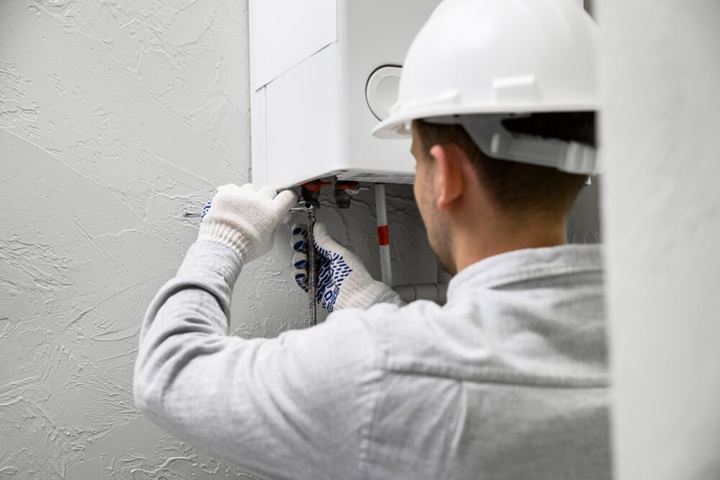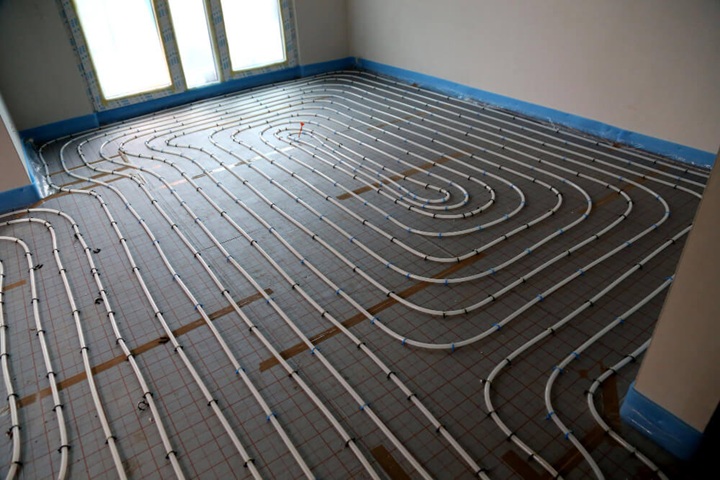Thinking about pairing your underfloor heating with a new boiler? The right choice can make your home warmer and more efficient while avoiding costly mistakes. Learn what is the best boiler for underfloor heating for more efficient heating this winter.
Underfloor heating works differently from radiators, so choosing the best boiler for underfloor heating isn’t always straightforward. In this article, we’ll explore which boilers suit water and electric systems, how to size your underfloor heating boiler, and what makes some options cheaper to run than others. By the end, you’ll understand exactly what to look for when selecting the right boiler for underfloor heating in your home.
Key Points:
- Most boilers can work with underfloor heating, but some perform better.
- Condensing boilers and combi boilers are common choices.
- Boiler sizing depends on your home’s heating demand and insulation.
- Water-based underfloor heating is often cheaper to run long-term.
- Electric boilers can also be used in smaller homes or rooms.
- What Are The Main Underfloor Heating Boiler Requirements?
- Why Combine Underfloor Heating With A Boiler?
- What Is The Best Boiler For Underfloor Heating?
- Is Electric or Water Underfloor Heating Cheaper?
- Choosing Electric Boilers for Underfloor Heating
- What Size Boiler for Underfloor Heating?
- What To Consider Before Installation
- Heat Pumps As An Alternative To Boilers
- Combine Underfloor Heating With Boilers
- FAQs
- Sources
What Are The Main Underfloor Heating Boiler Requirements?
Underfloor heating systems operate at lower flow temperatures than radiators. Instead of sending water around at 70°C or higher, a wet underfloor system usually works between 35–55°C. This means most modern boilers can be used, but the setup needs to be compatible with these lower operating temperatures.
Wet underfloor heating systems connect directly to a boiler. They are best matched with a condensing boiler that can recover heat efficiently.
Electric underfloor heating systems don’t always require a boiler, but if your home uses one already, you can integrate both systems for overall comfort.
A modern underfloor heating boiler should:
- Handle lower flow temperatures without losing efficiency.
- Work with controls that allow separate zoning between radiators and UFH.
- Be powerful enough to meet total heating and hot water demand.
Tip: If you’re not sure what size boiler for underfloor heating you need, start by calculating the total heat loss in each room. A heating engineer can help confirm the right choice.
Browse our wet underfloor heating kits
Why Combine Underfloor Heating With A Boiler?

A boiler for underfloor heating provides a reliable and consistent supply of heat. Unlike radiators, which create hot and cold spots, UFH spreads warmth evenly across the floor surface. When paired with the right boiler, the system runs more efficiently and helps reduce monthly bills.
Benefits of combining a boiler with UFH:
- Lower running costs – UFH operates at lower flow temperatures, meaning the boiler burns less fuel.
- More comfort – Even heat distribution eliminates draughts and cold corners.
- Future-proof heating – Boilers, particularly condensing types, are designed to work well with low-temperature systems.
- Room control – Advanced thermostats allow you to heat different zones individually.
If you’re considering a new boiler, remember it’s also worth knowing whether a new boiler can increase house value
What Is The Best Boiler For Underfloor Heating?
There isn’t one single “underfloor heating boiler” — most types can work, but some pair better with UFH than others. Let’s look at the most common choices:
Gas Combi Boilers
- Compact, providing hot water and heating on demand.
- Can run UFH with minor adjustments such as a two-port valve, which prevents overheating when radiators and UFH run together.
- Best for smaller to medium homes.
Condensing Boilers
- Designed to recycle waste heat that would otherwise be lost.
- Work at peak efficiency at lower water temperatures, making them a top match for underfloor heating.
- Ideal if you want the best boiler for underfloor heating in terms of efficiency and long-term savings.
Oil or LPG Boilers
- Suitable for rural homes without mains gas.
- Can run UFH effectively, though installation costs may be higher.
Electric Boilers
- Simple to install and don’t need a flue.
- Well-suited for small spaces or homes with no gas supply.
- A 6kW model can often power underfloor heating for smaller properties.
If you’re unsure which type suits your home, check our electric underfloor heating kits
Is Electric or Water Underfloor Heating Cheaper?

Running costs depend on the size of your property and your energy tariffs. In general:
- Water underfloor heating is cheaper long-term. It has higher installation costs, but once in place, it works efficiently with a gas or condensing boiler.
- Electric underfloor heating is quicker and cheaper to install but more expensive to run per unit of heat produced.
According to the Energy Saving Trust, reducing the hours your heating runs and managing room-by-room controls can also cut bills significantly. Pairing these habits with the right underfloor heating boiler helps keep long-term costs manageable.
Choosing Electric Boilers for Underfloor Heating
One of the questions many homeowners ask is whether you can use an electric boiler for underfloor heating.
The answer is yes.
Because underfloor heating only needs a flow temperature of around 35–55°C, most electric boilers are more than capable of meeting this demand.
Electric boilers are compact, easy to install, and don’t need a flue or gas supply. This makes them popular for smaller homes, apartments, and properties that aren’t connected to mains gas.
When considering the best boiler for underfloor heating in small spaces, an electric option can be highly practical. For example, a 6kW electric boiler can often power a single-zone UFH setup in a flat or one-bedroom house.
Advantages of electric boilers for UFH:
- No need for gas or oil supply.
- Lower upfront cost compared with some gas boilers.
- Compact design – can be fitted almost anywhere.
- Quiet operation.
Disadvantages:
- Higher running costs compared with gas or condensing boilers.
- Less efficient in larger properties with multiple heating zones.
What Size Boiler for Underfloor Heating?
Choosing the right boiler size is one of the most common concerns. Many people assume a bigger boiler automatically means better performance, but that’s not the case. The boiler needs to be correctly matched to the heating demand of your home.
Factors that affect boiler size for UFH:
- Property size – Larger homes with more rooms will naturally need a higher output.
- Insulation quality – Well-insulated properties lose less heat, reducing the boiler size needed.
- Number of bathrooms – Hot water demand affects boiler output, especially with combi boilers.
- UFH coverage – A whole-house water underfloor heating system will require more from your boiler than a single-room installation.
As a rough guide, many family homes work well with boilers in the range of 18–30kW. However, the exact answer to “what size boiler for underfloor heating?” depends on professional heat loss calculations. An engineer can assess your home and ensure the boiler capacity is right.
What To Consider Before Installation
Before fitting an underfloor heating boiler, it’s worth planning for a few practical details. Getting these right will help the system run smoothly for years.
- Boiler capacity – Confirm that your chosen boiler has the right output for both heating and hot water.
- Smart controls – Modern thermostats allow you to programme room-by-room heating. Many connect to WiFi for remote adjustment and usage tracking.
- Floor build-up – Underfloor heating adds height to floors. Check for door clearance and smooth transitions between rooms.
- Professional installation – Always use a qualified installer. This ensures your boiler and UFH system are set up safely and efficiently.
To learn more about setting your UFH to the right level, read our guide on what temperature underfloor heating should be set at
Heat Pumps As An Alternative To Boilers
While many homes rely on boilers, heat pumps are becoming more popular, especially in new builds. A heat pump extracts warmth from the air or ground and circulates it through your heating system.
Because UFH operates at lower temperatures, it pairs very well with a heat pump. This makes it a sustainable alternative to a traditional underfloor heating boiler.
Points to note:
- Heat pumps may not provide water as hot as a gas boiler.
- If you have radiators as well as UFH, you may need larger radiators to match the lower flow temperature.
- Initial installation costs are higher, but running costs can be very competitive.
Combine Underfloor Heating With Boilers
At Underfloor Heating Trade Supplies, we stock everything you need to get the most from your underfloor heating boiler setup. From wet underfloor heating kits for whole-house installations to electric underfloor heating solutions for single rooms, our products are designed to work seamlessly with a wide range of boilers.
Whether you’re deciding what size boiler for underfloor heating you need, or weighing up which type is best for your home, our team is here to guide you through the process with expert advice and reliable products.
In conclusion, the best boiler for underfloor heating depends on your property size, fuel supply, and budget. Condensing boilers often give the best efficiency for water systems, while electric boilers can be a good option in smaller homes. Always check what size boiler for underfloor heating your property requires before installation, and consider professional advice to get it right the first time.
FAQs
Do I need a specific boiler for underfloor heating?
No, you don’t need a specialist boiler for underfloor heating. Most modern boilers – including combi, condensing, and oil models – can work with UFH. However, some systems may need minor adjustments to ensure your boiler and underfloor heating run efficiently together.
Is underfloor heating suitable for my home?
Underfloor heating can be fitted in many types of properties, from new builds to renovation projects. It provides an even, comfortable warmth across large areas and, when combined with good insulation, can also help reduce heat loss in homes.
Can I run underfloor heating from my boiler?
Yes, you can. A water-based underfloor heating system can connect to most types of boilers, though condensing boilers usually offer the best performance. Electric underfloor heating is different – it doesn’t connect to a boiler at all but instead runs directly from the mains electricity through mats or cables.
What size combi boiler works with underfloor heating?
Most combi boilers are compatible with UFH, but sizing depends on your home’s heating and hot water demand. In many cases, adjustments such as adding a two-port valve are needed so the boiler can heat radiators and underfloor zones separately without overheating. A heating engineer can confirm what size boiler for underfloor heating is right for your property.
How does an underfloor heating thermostat work?
An underfloor heating thermostat works much like a standard one, letting you set and adjust room temperatures with ease. You can opt for a simple manual version or choose a smart thermostat that connects to an app. Smart controls give you the flexibility to manage your heating remotely and create schedules that suit your lifestyle.
Do I still need radiators with underfloor heating?
You don’t need radiators in a room that has underfloor heating, but it’s fine to keep them if you want extra flexibility. Some homeowners remove radiators entirely when installing UFH, while others keep them switched off and use them only as a backup. If you’re considering removing radiators completely, it’s important to calculate whether your underfloor heating system can provide enough output for the space.
Sources
Energy Saving Trust. (2025) When should I put my heating on? [online] Available at: https://energysavingtrust.org.uk/when-to-put-heating-on/ [accessed 08/09/2025]
